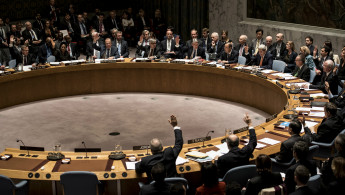Main Syrian opposition confirms boycott of Sochi talks
The Syrian Negotiations Commission confirmed on Saturday that it will not be attending Russia’s peace congress on January 30 in Sochi.
"The Syrian negotiation commission of revolutionary and opposition forces declares boycott of the congress in Sochi called by Russia for January 29-30," the High Negotiations Committee tweeted.
The comments come follow a week which saw Syria's opposition and government attend two days of talks hosted by the United Nations in Vienna.
Borth signed a ceasefire agreement over the fighting in the suburbs of Damascus, said a Syrian opposition spokesperson on Friday.
Earlier in the month, Russia's UN ambassador said he hoped the UN-led talks on Syria would 'reinvigorate' the peace process ahead of the Russian-brokerfed talks planned this month in the Black sea resort of Sochi.
Vassily Nebenzia said that a round of Geneva talks "will be more fruitful, and that it will contribute to Sochi, and then Sochi in reciprocity will contribute to future Genevas."
The last round of UN-backed Syria peace talks were concluded in mid-December in Geneva, with no foreseeable progress to bringing the seven year conflict to an end. Talks resumed in Vienna ahead of the Sochi talks on Thursday.
Moscow has spearheaded the talks in Astana over the last year in an attempt to turn its game-changing military intervention into a negotiated settlement.
Russian president Vladimir Putin hosted talks with Turkey and Iran in November - the first such three-way summit between the trio.
The cooperation has continued despite Turkey still officially being on an opposite side of the Syria conflict from Russia and Iran.
Russia, along with Iran, is the key backer of Syrian President Bashar al-Assad and Moscow's military intervention inside Syria is widely seen as tipping the balance in the conflict.
Turkey, however, has backed the rebels seeking Assad's departure in a conflict that has left more than 330,000 dead.
In a joint statement after the talks, Putin, Iranian President Hassan Rouhani and Turkish President Recep Tayyip Erdogan emphasised the need for all parties in the Syrian conflict to release all prisoners and hostages, hand over bodies and search for those missing to help create conditions for lasting cease-fire and the launch of political talks.
Russia and Turkey have been working together since a 2016 reconciliation deal ended a crisis caused by the shooting down of a Russian war plane over Syria. The two countries have since cooperated closely on establishing de-escalation zones in Syria.
Staffan de Mistura, the UN Syria envoy, said that Russia's plan to convene the congress is dependent on its ability to support the UN-led Geneva talks taking place.
He also needs Russia's support to keep Assad's regime involved in UN talks, which failed to make progress in December with De Mistura laying blame on Damascus for the "golden opportunity missed".
Since the start of Syria's war in 2011, numerous diplomatic attempts to halt the conflict have stumbled, mainly over the future of Assad.
Late last month, a statement released by nearly 40 rebel groups, including some of the military factions that took part in the earlier rounds of the peace talks, said there was no real pressure being placed on the Syrian government by Moscow to reach a political settlement.
The Syrian conflict began when the Baath regime, in power since 1963 and led by Assad, responded with military force to peaceful protests demanding democratic reforms during the Arab Spring wave of uprisings, triggering an armed rebellion fuelled by mass defections from the Syrian army.
The brutal tactics pursued mainly by the regime, which have included the use of chemical weapons, sieges, mass executions and torture against civilians have led to war crimes investigations.





 Follow the Middle East's top stories in English at The New Arab on Google News
Follow the Middle East's top stories in English at The New Arab on Google News
![Israeli forces ordered bombed Gaza's Jabalia, ordering residents to leave [Getty]](/sites/default/files/styles/image_330x185/public/2176418030.jpeg?h=a5f2f23a&itok=_YGZaP1z)

